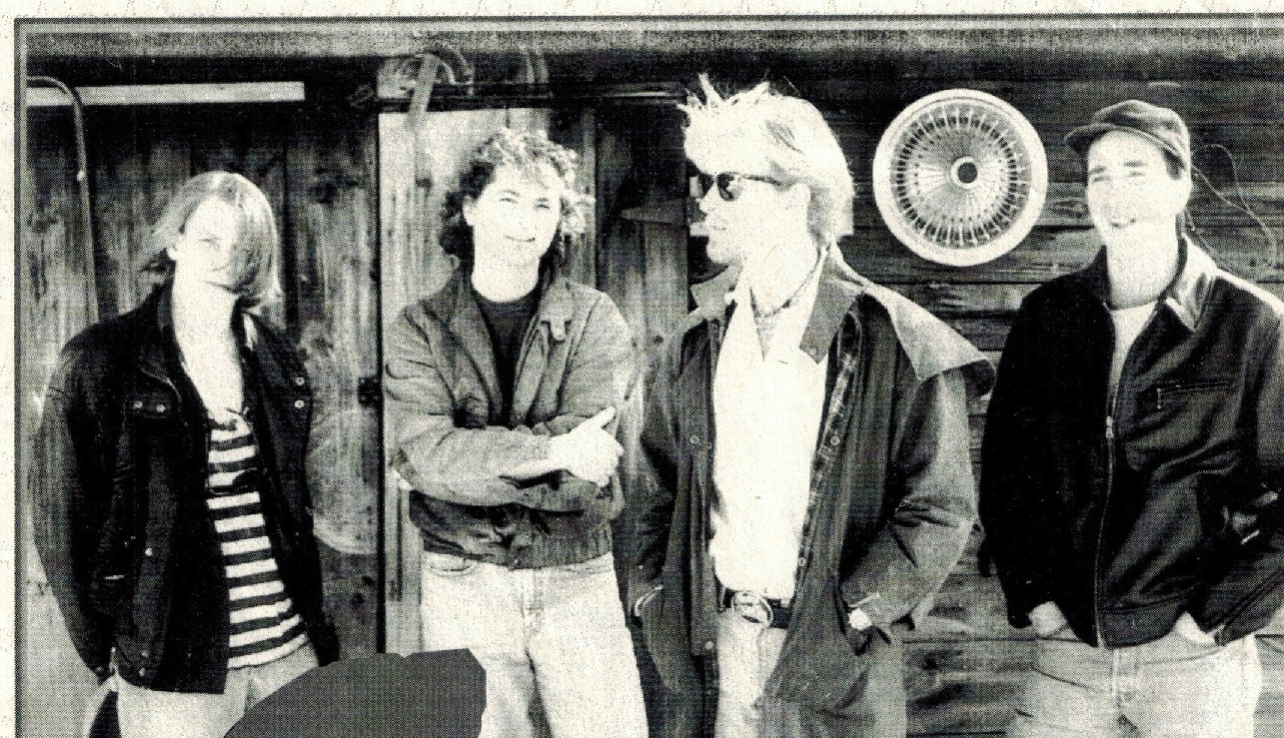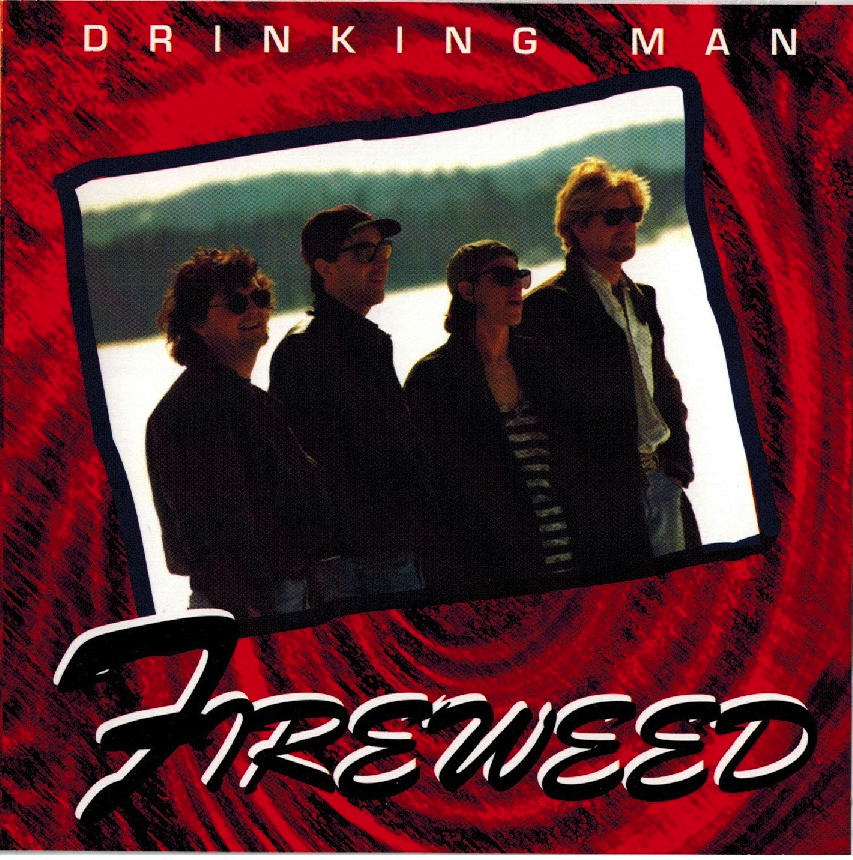Throwback Thursday: Fireweed (aka The Fireweed Company) – Drinking Man (1994)

By Zachary Houle
It has been said that Ottawa is the city that fun forgot – a cliché if there was one. However, if you suppose that that statement is true, then consider the state of the Ottawa Valley. I grew up in the small town of Barry’s Bay, Ontario, which is literally right next door to the middle of nowhere – Algonquin Provincial Park. As a youth growing up there, I can tell you that there wasn’t all that much happening. There was a ski hill, which obviously meant that if you wanted something to do during the winters, you skied. If you were a jock, you played in one of the after-school sports at Madawaska Valley District High School (MVDHS). But if you weren’t a jock, there wasn’t all that much you could gravitate towards. Sure, there were house parties to go to every now and then, but I was pretty straight-edge: I didn’t touch a drop of alcohol until my 19th birthday. So those parties, for me, were often rather middling at best.
However, music geeks such as me did have an underground network of friends and acquaintances that provided mixtapes or CDs for you to record on your own. And, in the final year of my studies at MVDHS, something happened. A local country-rock band emerged: Fireweed. And they had a CD to shill! Drinking Man was a source of salvation. It gave you concerts to go to, and a reason to be proud of the area you grew up in. Fireweed – which has since changed their name to The Fireweed Company – remains an incredibly popular band in the Madawaska Valley. Their concerts routinely pull in 800 people in an area where only a few thousand live. Consider that for a moment if you’re an Ottawa band. Wouldn’t you love to have 800 people show up to your gigs? In that sense, Fireweed was and is one of the most enduring and well-liked groups in the Ottawa region.
Not everything was all wine and roses, though. As is the case with many Valley bands, the group had its issues cracking the Ottawa market. I interviewed the band extensively during the mid-90s and, on one occasion, while sitting down with the outfit for a feature in Carleton University’s student newspaper, the Charlatan, in September 1995, guitarist and backing vocalist Steve Gutoskie lamented the fact that Fireweed just wasn’t getting any respect in O-town.
“Ottawa has slammed the door in our face,” he said. “Everyone’s heard of us, and CHEZ and the university stations occasionally play our stuff, but stations like the Bear and the CBC just won’t support us. They won’t even return our phone calls.” However, Fireweed did have a streak of supportiveness for their peers. Bassist Bob Coulas said in the same interview that, “Music isn’t a competition. We want to listen to other (local) bands and like them, and we just want to play.”
And play the group has throughout nearly 25 years. Formed in 1992 in Killaloe, Ontario, Fireweed centers around the slice-of-life lyrics of singer and rhythm guitarist Jayson Bradshaw and the fiery lead guitar attack of Gutoskie. I had the pleasure of seeing Fireweed live on many occasions, and I can tell you that they are an incendiary group: Gutoskie has been known to burn the barn doors down on a cover of Tom Petty’s “American Girl”.
If you haven’t heard of Fireweed, musically they are a cross between the Canadiana blues rock of the Tragically Hip and more country rock stylings. Listening to the Drinking Man now, I hear a certain debt to Hootie and the Blowfish. However, that comparison might be a delusory one. It shouldn’t be, as Fireweed certainly are a more serious and honed band than Hootie ever was, but a touch of that
influence remains.
The key to appreciating Drinking Man, which was made in a marathon 36-hour recording session at Toronto’s Metalworks studio and mastered by Peter Moore, who had produced the Cowboy Junkies, is entering the album through the lyrics. Bradshaw has an uncanny eye for detail in portraying the lives of characters that live in small villages. “Well, I can’t stand this town no more / Time to run from my conscience, in the morning it’s no more / Time to run and hide – leave this town behind,” Bradshaw sings on “Sore Conscience”.
Drinking Man, indeed, is choc-a-bloc with stories about people who populate the villages of the Valley: “Three Shots” is a harrowing story of domestic assault that ends in murder, and the title track is about a man with “no education, no skills or trade.” “Box of Beer”, a rocking punky number, is a sarcastic look at the drinking and drug culture of the Valley. (I wound up calling in and requesting the song to be played at 4 a.m. one morning on CKCU when I apparently couldn’t sleep, and they actually honoured my request.)
There are deviations from the country-rock tinged sounds on the album, though. “Stone Jammin’” is very much a nod to the alterna-rock scene of the time, owing a great deal to Pearl Jam, and the album ends with a spoken word piece, “Home Tattoo”. While there might be obvious influences and touches of styles of music that were popular at the time, the band was trying to do its own thing. “Writing-wise, I don’t have another band as an influence,” Bradshaw told me in an interview for the Eganville Leader in August 1994. “I like other bands but I don’t ever look at them and say, ‘I want to write like that or sound like that.’ I try to stay away from sounding like other bands because originality is the bottom line.”
As to his lyrical genesis, Bradshaw also explained, “If you watch the news, you can find a story anywhere really. Or watch your next door neighbours sometimes … .” Drinking Man remains a key album of the Ottawa Valley, just as important as anything recorded by folk group the Wilno Express. It was a successful album for the band: a year after its release, it had gone on to sell 850 copies (again, local bands may salivate at that sales figure). While the record is now sadly out of print, the band members still get asked about it on the streets of their respective towns (the group is now based in Combermere, Pembroke and Wilno). However, you can listen to the record for free on the CBC Radio 3 website.
The group, which has undergone some personnel changes and the slight name change (though Bradshaw and Gutoskie still remain), has since gone on to release a sophomore record, 2007’s As long as you know … , which is arguably tighter and more focused. The Fireweed Company has also released a video for a tune that has yet to show up on an album for “The Philosophical Song”. Definitely, the Fireweed Company is still going strong, and Drinking Man remains a testament to forging one’s own path in a region where there isn’t all that much to do, so you might as well make your own entertainment. That the album still sounds fresh and fundamental, some 20 years later, shows just how essential a record it is.
The next time you’re in the Valley, and these guys are playing a show, certainly do try to check them out. You’ll be in for a very, very good time. Until then, we thankfully have their recorded output to tide us over, especially for those of us simply looking for a good time to be had in the comfort of your own home.
Zachary Houle is the Canadian Music Editor for PopMatters.com, a Chicago-based webzine that attract 1.3 million unique visitors globally each month. He also reviews books for bookwookie.ca. In addition to his music and book writing, he has had freelance journalism published in SPIN, the Ottawa Citizen, the National Post and Canadian Business. He also dabbles in fiction and poetry, and his work here has been published in literary magazines in Canada, the US and the UK. He was a recipient of an emerging artist grant from the City of Ottawa, and was nominated for a US Pushcart Prize for his work.

